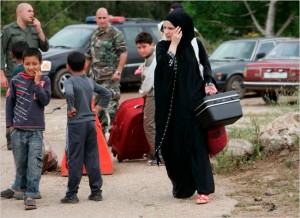 The border crossing between Syria and Lebanon was frantic on Tuesday, as it had been for many months. But, unusually, amid the hordes of people at passport control on the Lebanese side of the Masnaa crossing were queues of well-heeled Syrians – types not often on the move even well into this third year of war.
The border crossing between Syria and Lebanon was frantic on Tuesday, as it had been for many months. But, unusually, amid the hordes of people at passport control on the Lebanese side of the Masnaa crossing were queues of well-heeled Syrians – types not often on the move even well into this third year of war.
Well dressed, with front-of-the-line privileges, for them the crossing was far simpler than for the crowds standing behind.
“Some even use the military lane,” said a Lebanese border guard, referring to the fast “no-questions” route open to VIPs, from either side, and to Hezbollah.
Rumours of an imminent air attack launched by Britain, the US, France and even Turkey is all around the Syrian capital, Damascus, those crossing the border said. So too is a sense that this time, Syria’s foes are not bluffing.
Among those leaving for the relative safety of Lebanon was Salah Abur Rahman, a businessman from Damascus who had lately done very little trade and feared that the rumble of an approaching attack was not about to change that.
“My family have been in Lebanon for a long time, but it’s time for me to go as well,” he said. “Whatever is coming is going to do a lot of damage, one way or another.”
The Masnaa main crossing has remained open since Syria’s troubles began in 2011 and has been one of the few remaining outlets for Damascenes seeking respite in Lebanon or beyond.
Much of the middle class of the Syrian capital has gradually left as the war has ground on. But now it is the elite that is quitting. Several well-known businessmen who crossed the border on Monday said they planned to ride out any air strikes in the Lebanese mountains.
Another man, who owned a financial service business and had worked closely with Rami Makhlouf, the first cousin of the Syrian president, Bashar al-Assad, said he had given up on Damascus for now and would stay outside the country until the war had been resolved one way or another.
“They will bomb the airfields and the state buildings,” he said. “They can bomb what they want. There isn’t much left of the country, and that’s the reality.”
The relative safety of central Damascus has been a focus of the Syrian regime’s attempt to project an air of normality. There, unlike the ravaged outskirts or empty marketplaces closer in, restaurants have stayed open and a cafe culture still exists. But even in this security bubble, where all key institutions of state reside, an attack is seen as inevitable.
“My uncle is a senior officer,” said Abur Rahman. “He is one of the decision-makers, and this week the only decision he’s making is where to take shelter from the American planes.”
Elsewhere in the city there is little doubt that a new phase of the war is drawing near, according to people contacted by the Guardian via Skype. People are stockpiling whatever food they can find, taping their windows, and preparing candles and water for an air war they fear could roll on for weeks. Syria’s education system has all but ground to a halt, with childcare facilities and most secondary schools in Damascus shut down. Many primary schools, however, remain open.
Assad Ali, 24, a computer worker, said the expected attack was being welcomed in some quarters. Despite having had no trouble from the Syrian military or the dreaded state security services, he thought the war needed to end.
He said: “We expect it soon. We will be so happy if the US and UK attack Syria. I believe the US and British army will attack all the regime’s defences as well as some positions for the FSA [Free Syrian Army]. I think any attack launched by the US and UK will be for the interest of the Syrian people. Any new regime coming to Syria won’t be worse than what we are going through now.
“All those who are in support of the regime say that they will sacrifice themselves for Syria and Assad. But they all will run away at the first bullet. We expect the soldiers to flee with the first US rocket landing on Syrian land.
“We can feel that the soldiers are in a state of high alert and fear. We won’t keep any weapon in our house. As long as the UN inspection teams are still in Syria, the attack won’t happen. Only [it could] when they leave.”
Ziyad, a man in his 50s, told Reuters: “The big fear is that they’ll make the same mistakes they made in Libya and Iraq. They’ll hit civilian targets, and then they’ll cry that it was by mistake – but we’ll get killed in the thousands.”
Haitham, a retired civil servant who lives in the northern neighbourhood of Hameh and opposes the Assad government, said: “If I could I’d leave town for a week until this is over. It’ll be only a matter of days.”
Guardian

Leave a Reply
You must be logged in to post a comment.